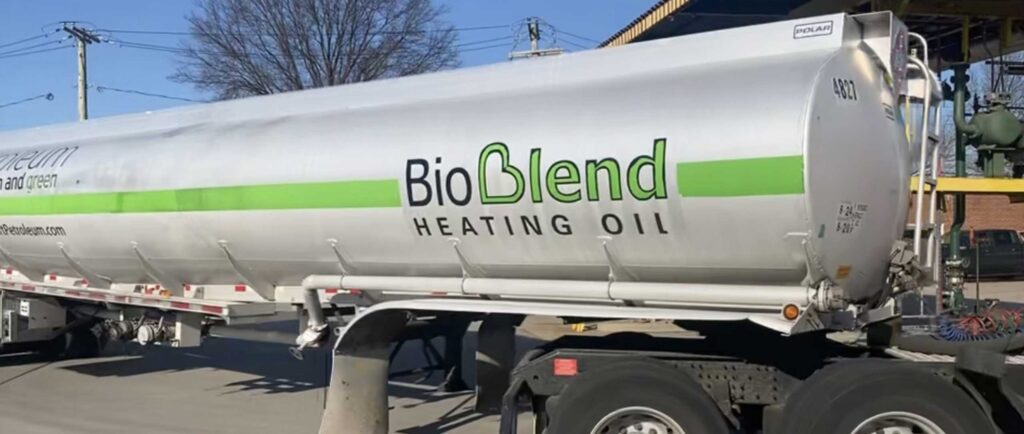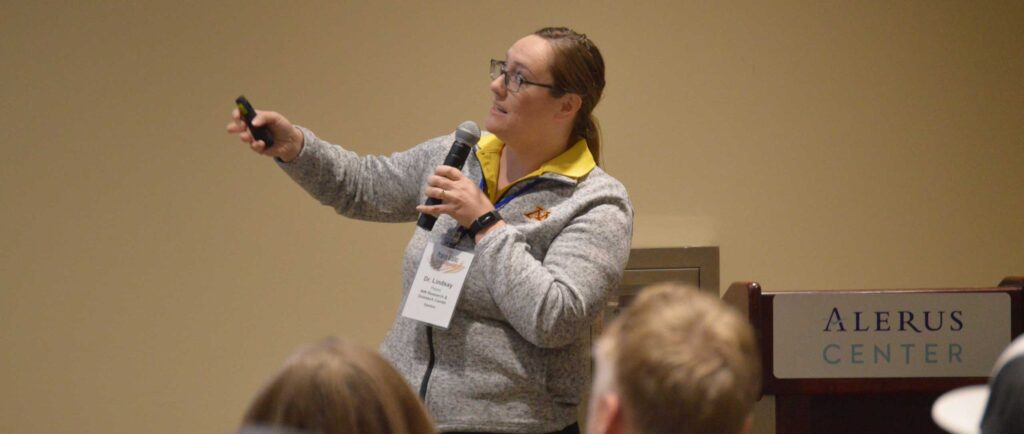This story first appeared in the July-August 2016 issue of Soybean Business, the magazine of the Minnesota Soybean Growers Association. Click here to read more articles from Soybean Business
Soybean oil plays a key role in product that could extend road life
When Jim Heltemes Jr. tells his customers he has a product that can extend the life of their asphalt when applied every three to five years, he hits a roadblock. While cost is a factor, it’s usually not the stumbling block he encounters.
“The one thing you notice with RePLAY is you can’t tell where you’ve applied it,” he quips. “People want their lots black. RePLAY is not black.”
And therein lies the problem. Heltemes, vice president of Bargen Incorporated, says his customers oft en answer to committees or city councils. And when residents don’t see dark, black roads, parking lots or bike trails, they think the city or entity isn’t maintaining the pavement. What they don’t realize is they end up with a surface that looks faded, reduces costs, absorbs less heat and is good for the environment.
So what is RePLAY?
RePLAY Agricultural Oil Asphalt Seal and PRESERVATION Agent is a patented solution that extends the life of paved asphalt surfaces. RePLAY is made from 88 percent biobased solutions with more than 50 percent made from soybean oil.
Developed by BioSpan President and CEO Sheldon Chesky with research funds from United Soybean Board (USB) and the soybean checkoff , RePLAY not only extends the life of asphalt surfaces, but cuts down on labor costs, reduces road closures during application and eliminates the harmful fumes of petroleum products used for road maintenance. Unlike other preventive maintenance systems, there is no need to restripe with RePLAY. It also helps maintain skid resistance, which deteriorates as the asphalt’s condition worsens.
In a state like Minnesota where winter freeze turns to spring thaw, potholes and cracking are a major problem.
According to BioSpan, RePLAY has been proven to penetrate into the asphalt where it works as a sealant, one that helps to reverse the oxidation of asphalt and hence, slow the development of potholes and cracks.
“If applied correctly, RePLAY will turn the pavement to dark gray and will fade to light gray over time, just as regular asphalt does over time,” Chesky says.
A lighter surface could help reduce the amount of heat asphalt absorbs.
“There certainly is a lot more heat absorbed by black asphalt that accelerates degradation and ultimately radiates back much to the discomfort of those on the material relative to the cooler and longer lasting biotreated surface,” says Agricultural Utilization Research Institute (AURI) microbiologist Dr. Jimmy Gosse.
Success in Minnesota
John Olson is the Public Works Manager for Hutchinson, Minn. He started using RePLAY about five years ago and swears by it. As the manager, he is responsible for 70 miles of roads. Olson said before suggesting Hutchinson should adopt the use of RePLAY, he had questions he needed answered.
“We wanted to make sure we were not making a road dangerous,” he says. “We were also concerned with water penetration. We wanted to know if it helped with cracking. I believe that it does help with all of this.”
Olson says that he hasn’t seen any issues with skidding, which was a big concern when it came to road safety. Oft en time roads are seal coated, also known as chip sealing, with petroleum products that can make the surface slippery. To test out the skid resistance of RePLAY, Olson did a simple test. He took his pickup out, drove it down a road at a higher speed and slammed on the breaks. While not scientific by any means, the results satisfied him.
“It doesn’t affect skid resistance in any way,” he says. “I’m confident of that.”
Olson says that roughly one-third to one-fourth of the roads in Hutchinson have been sealed with RePLAY. At first, they concentrated on new roads for application. Some of the roads were completed in 2012 and will becoming due for maintenance in 2017.
“It’s probably the next stage in the experiment to do those roads a second time,” he says.
This next stage will help to validate why he chose to go with RePLAY in the first place — cost. Olson estimates that by using RePLAY, he can save roughly 30 percent on his road budget each year.
“If I put that material down, and I am filling fewer cracks and not having to deal with raveling, which leads to chipping or doing something to bring the road back, then I’ve kicked that can down the road to where it is more manageable to maintain. Yes, I am spending money at Year 1 and Year 6, but the condition of the road is still in place, and I am saving money.
A checkoff relationship
Mike Youngerberg, senior director of field services for Minnesota Soybean, says there has been a shift in thinking when it comes to how the New Uses action team views projects. Each year, USB and state soybean checkoffs invest in new uses for soybeans. Often times, those products pass through the research and development phase and become an after thought because there are many barriers to taking a research concept and making it a commercially successful product that can compete against traditional products that are often made with foreign oil.
“Our farmer leaders have been very vocal about making sure that investments are more than developing products but also making sure that those products find a market,” he says. “Even a niche market helps increase the use of soybeans, and that’s important for Minnesota farmers.”
The difference with products such as RePLAY is that the asphalt market holds a lot of potential for soybean producers. According to the National Asphalt Pavement Association (NAPA), there are approximately 18 billion tons of asphalt pavement in the U.S., with more than 2.6 million miles of paved roads, 93 percent of which are paved with asphalt.
“It takes soybean oil from roughly 100 bushels of soybeans to maintain one lane-mile with RePLAY,” Youngerberg says. “So for every mile we are looking at roughly 200 bushels of soybeans, and we have more than 2.4 million miles of asphalt roads in the country. That’s a lot of miles and a lot of soybeans.”
What’s next?
MSR&PC District 7 Director Jim Willers chairs the Council’s New Uses action team. He points to a long relationship with AURI as a key part of promoting RePLAY and other similar products.
“AURI is a very valuable partner when it comes to investing soybean checkoff money into developing new uses for soybeans,” Willers says. “We also believe that AURI can help bring a third-party, science-based credibility to the table when it comes to promoting the use of products.”
Willers says products such as RePLAY have allowed the Council to shift its thinking on how to invest checkoff money.
“We’re looking for fresh opportunities for soybean products already on the market,” he says. “As directors, it’s our responsibility to look beyond only developing a product and push toward adoption of the soy products in the marketplace.”
Harold Stanislawski, Project Development Director for AURI, says RePLAY is the type of product that farmers and Minnesotans should embrace. Minnesota has a decaying roads problem, is looking for solutions to help maintain water quality, and has a strong agricultural economy that could benefit from additional uses for ag products.
“This is a perfect marriage for Minnesota.” RePLAY Agricultural Oil Asphalt Seal and PRESERVATION Agent is a registered trademark of BioSpan Inc. Bargen Inc. is the exclusive, authorized master distributor. For more information visit biospantech.com.







